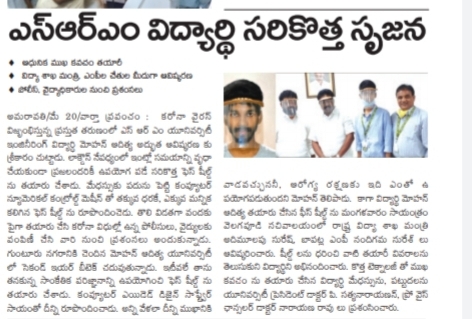All Management Events
- Nature Index June 5, 2020
The Hans India – June 6
Continue reading →
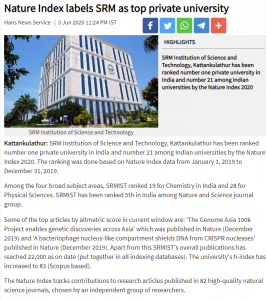
The Hans India – June 4
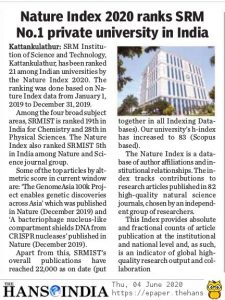
Mangala Times – June 3
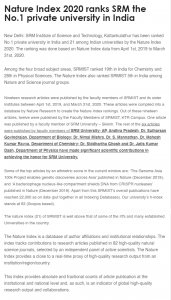
The Hawk – June 3
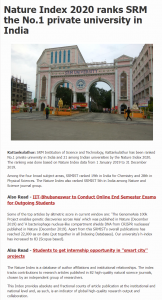
Free Press Journal – June 6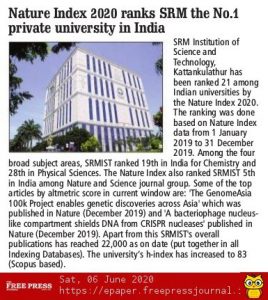
Global Greenews – June 15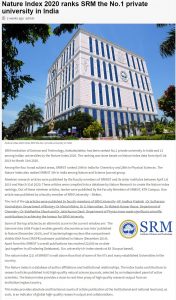
Global Greenews – June 5
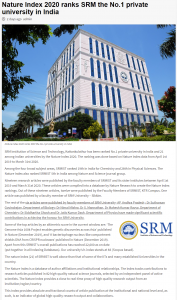
India Education Diary – June 3
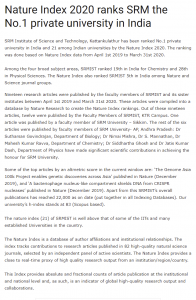
Photo Chronicle June 4
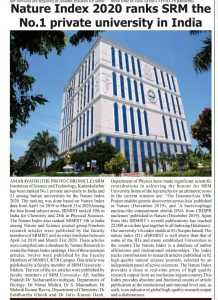
Trinity Mirror – June 4
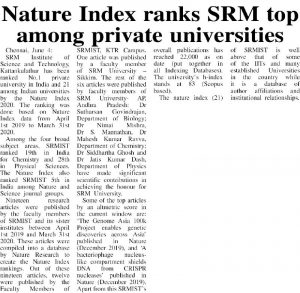
Covaimail – June 13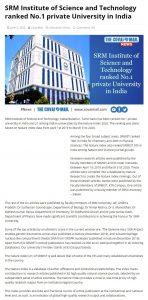
Covaimail – June 4
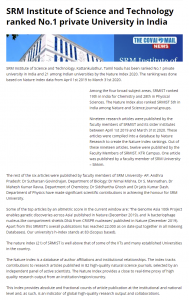
Collegedunia – June 3

Technology For You – June 14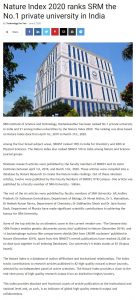
Technology For You – June 3
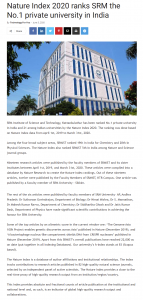
Eenadu – June 4
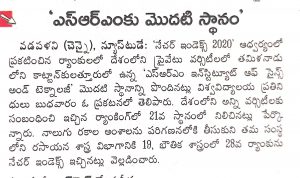
Andra Prabha – June 4
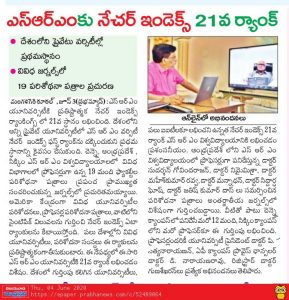
Namaste Telangana – June 15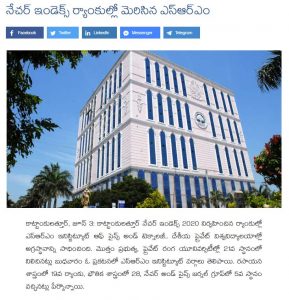
Namaste Telangana – June 5
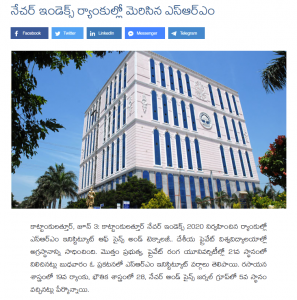
Namaste Telangana – June 4
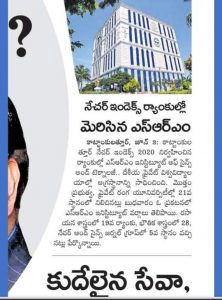
Subhodayam Subbarao – June 15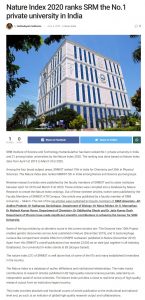
Subhodayam Subbarao – June 3
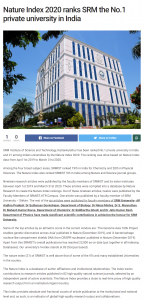
DJ iNExt – June 4
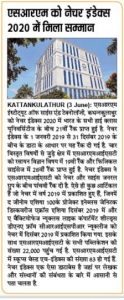
Daily Thanthi – June 4
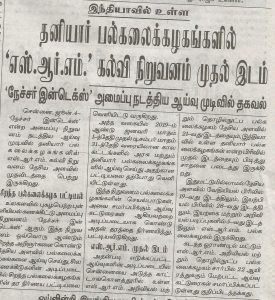
- LA HACKS June 5, 2020
Theweek – June 2
Continue reading →
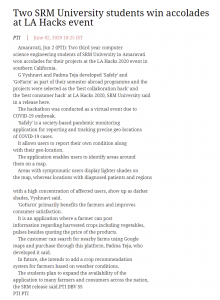
Outlook India – June 2
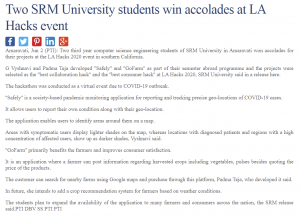
United News of India – June 2
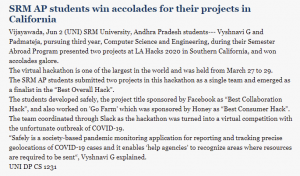
Yahoo News – June 2
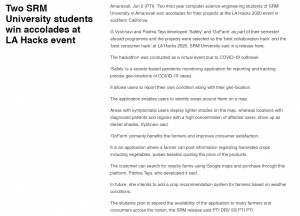
Mangla Times – June 2
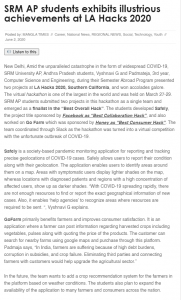
Globalgreenews – June 5
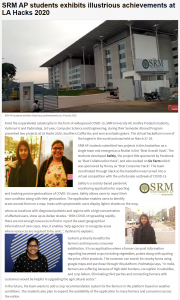
Latestly – June 5
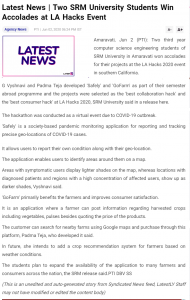
Rajadhani Varthalu – June 8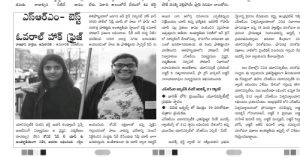
Andhra Prabha – June 5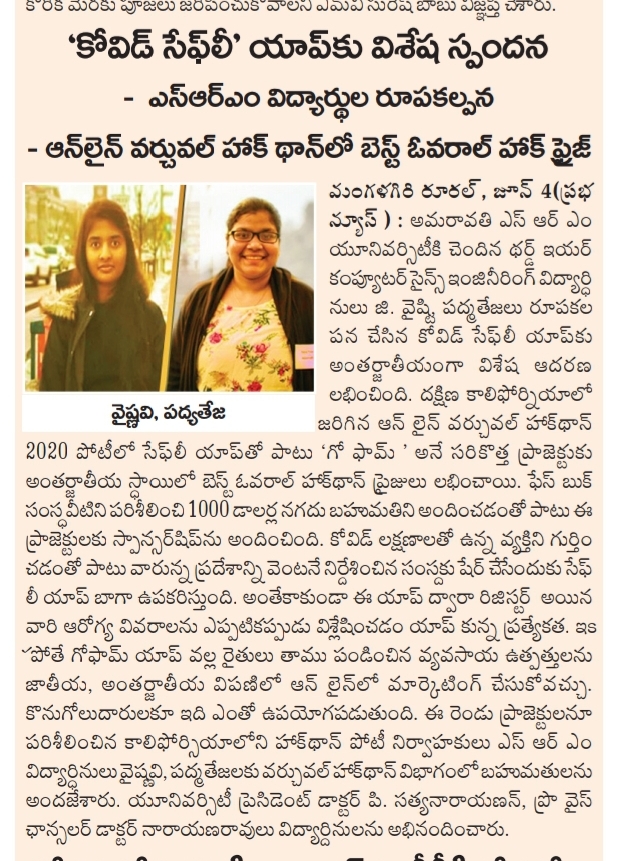
Palanaadu Vartha – June 5
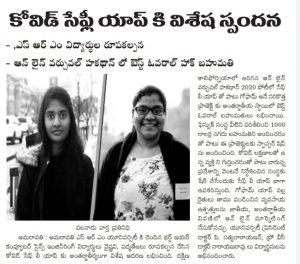
Kalvimalar – June 4
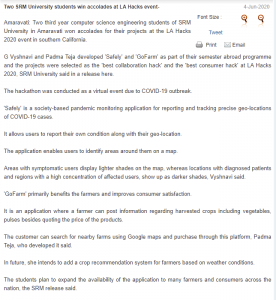
Technology for you – June 3
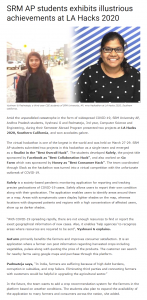
India Educationdiary – June 2
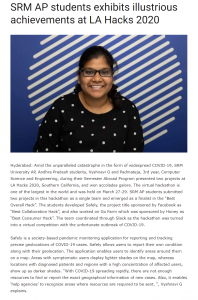
Devdiscourse – June 2
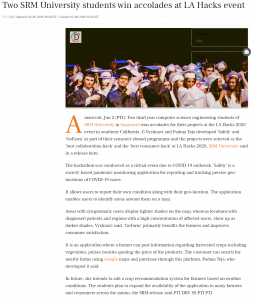
- SRM University AP and The Hindu organizes webinar on “Post COVID – 19: Science & Technology” May 29, 2020
Translational research is the key to thrive in Post COVID-19 era
SRM University AP, Andhra Pradesh, in association with The Hindu, organized the webinar to rethink the strategies for nurturing a scientific landscape in the post COVID situation. The webinar was chaired by Bharat Ratna Prof. CNR Rao, Linus Pauling Research Professor at JNCASR, Bangalore. Prof. Asuthosh Sharma, Secretary to Government of India, Department of Science & Technology (DST), Dr. S. Chandra Sekhar, Director, CSIR – Indian Institute of Chemical Technology, Hyderabad and Dr. Shashi Bala Singh, Director, NIPER, Hyderabad were the invited speakers. Prof. D. Narayana Rao, Pro Vice-Chancellor of SRM University – AP has initiated this webinar and was the moderator and Convener for the Webinar.
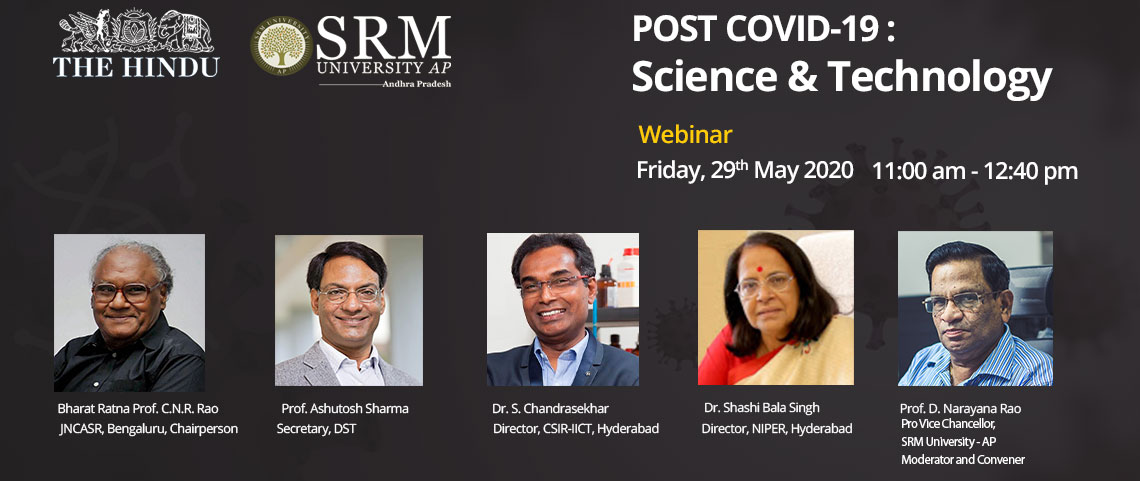
Prof. D. Narayana Rao expressed his gratitude to the prolific visionaries and scientists for being the panelists for the webinar and welcomed them heartily. In his opening speech, he emphasized the dire need for international collaborations. He further says, “India could definitely consider this as a potential opportunity and the Scientists, Technologists, Engineers, Bureaucrats and Policy Makers can reinvent the ways of doing research on Science & Technology. Breaking silos and collaboration among various sectors of Indian industries and academia to find solutions is crucial.” Prof. Rao also informed that CSIR Laboratories and outfits like BIRAC has built a strong bioscience foundation with a robust and start-up corporate base. He ardently believes that in a way COVID-19 Pandemic crises have catalyzed India and its Scientific Community.
Bharat Ratna recipient- Prof. CNR Rao believes in an empowered youth, a potential that if trained and utilized right can do marvels. He believes that human intelligence and determination can defeat COVID-19. He says, “Although this pandemic imposed a temporary slow down, it cannot diminish the intelligence and determination of the scientific community. Science is the urge of people to create and innovate which would keep shimmering even after lockdown.” Prof. CNR Rao supposes that India has to become competitive and futuristic and that the future of India depends on its zeal to be on the top.
 Prof. D. N. Rao conducting the webinar
Prof. D. N. Rao conducting the webinarAccording to Prof. CNR Rao, India today is marginal in science contribution. The scientists of the country should engage in 3 types of research: frontiers of science to combat COVID directly, research that helps in improving the important sectors of India, and domains where India has the potential to beat the rest of the world to be on top. He also attests that India should spend at least 2% of its GDP to promote Scientific and technological research. He concludes by saying, “The scientists need to think with their minds and consciousness. Those who don’t give up, end up achieving success.”
Prof. Sharma pointed out that Covid-19 days have taught us to adopt a problem-centric approach rather than a tool-centric approach. He says, “The future is about the convergence of science and technology. We should understand the fundamental challenges and use the opportunity.”. Prof. Sharma recommends that research should be profound and generate new ideas instead of incremental focus, along with having a socio-economic relevance. He further suggests, “Foundation of culture and confidence should be built. Best training should be provided, creative thinking and risk-taking abilities should be nurtured, systems should be able to absorb losses, and knowledge should be translated to meet the demands of the market.”
Dr. Chandra Sekhar says that in the Co-COVID era, the pursuit of science should be making the people future-ready. Cutting edge research is to be used to combat pandemics in the future. He says that, “Pandemics are going to happen. AI model, computational tools should be used to predict virus mutations and alerts should be given to researchers to prepare a vaccine beforehand. “
Dr. Shashi Bala aligns her speech to the same thread by saying, “For any country to be prosperous, science, technology and innovation are crucial. Indian R&D sector is very vibrant and we have the capabilities to be self-reliant in the sectors of Food and agriculture, biomedical equipment, and pharmaceuticals. All the stakeholders, funding agencies, ministries, government bodies, academia, R&D institutes should come together proactively and exhibit a participatory approach. We should not slow down this tempo which has already been built in the system across all stakeholders. We need to be gearing up our systems to create an ecosystem that is economically and financially vibrant in the co-COVID and post-COVID era.” Dr. Shashi Bala emphasizes that translational research should be made mandatory by the funding agencies. According to her, the main aim of translational research is to promote health and quality of life. Translational research can make a contribution by conforming to basic sciences and testing hypothesis in pre-clinical models. She concludes, “ This crisis has made us realize the phrase, “health is wealth.” We need to be self-reliant in terms of raw materials. We need to facilitate the domestic manufacturing of medical equipment. Fast-tracking of approvals and validation of prototypes are necessary. We need to promote interdisciplinary and inter-institutional research. Industrial participation at an early stage of research can also help in funding and commercialization of products.”
Continue reading → - Science-And-Tech – Webinar May 28, 2020
The Hindu – May 30
Continue reading →
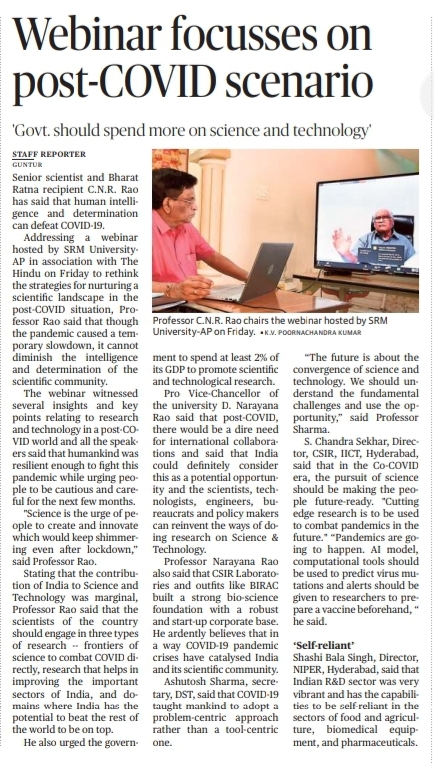
The Hindu – May 29
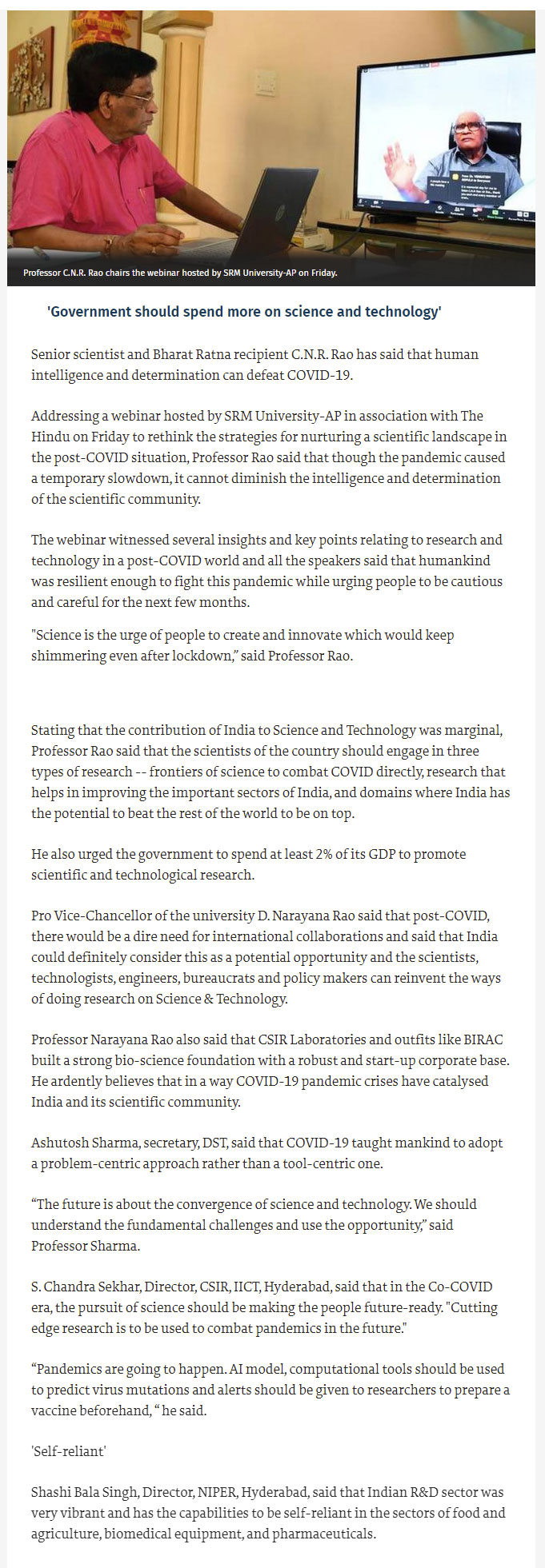
The Hindu – May 28
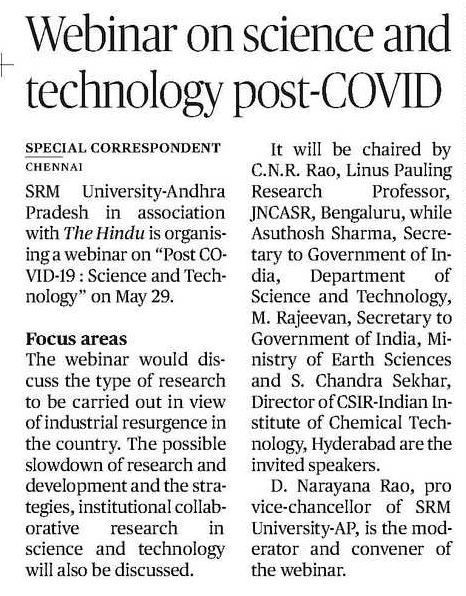
Andhra Naadu Daily – May 28
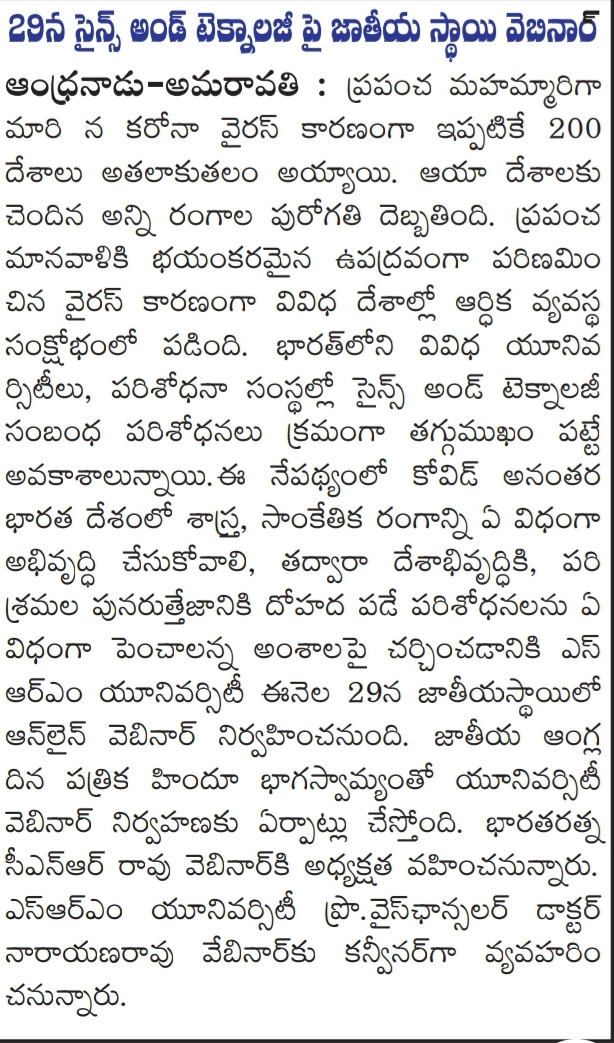
Andhra Prabha – May 30
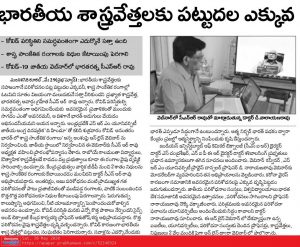
Andhra Prabha – May 28
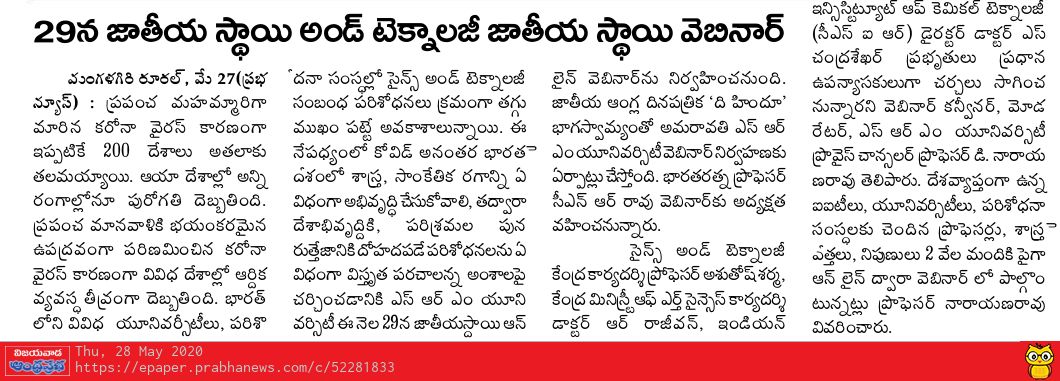
Eanadu – May 30
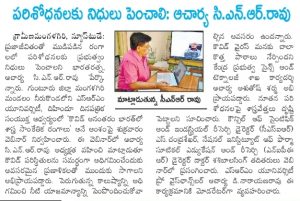
Eanadu – May 28
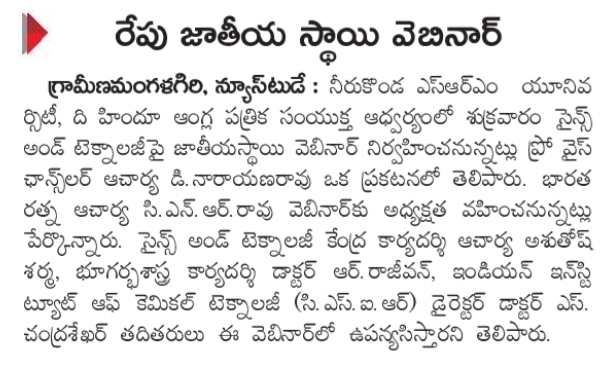
Palanaadu Vaartha – May 30
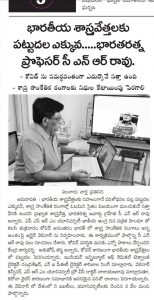
Palanaadu Vaartha – May 28
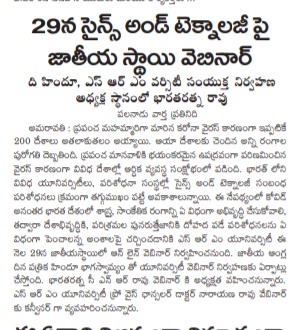
Rajadhani Varthalu – May 28
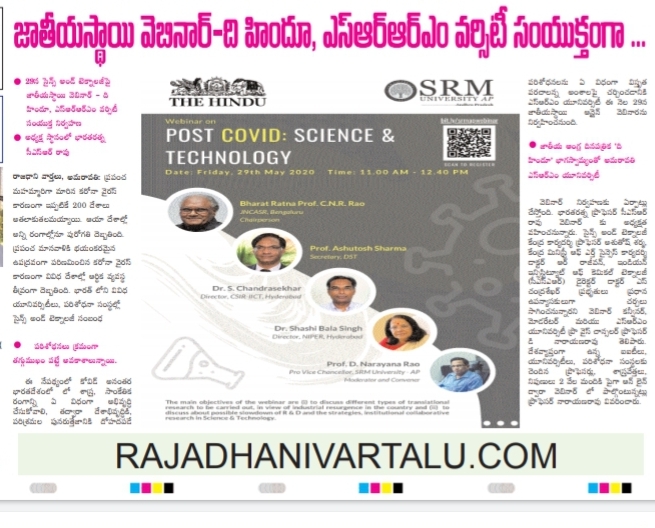
Sakshi Daily – May 30
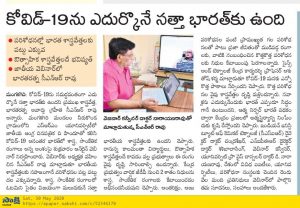
Sakshi Daily – May 28
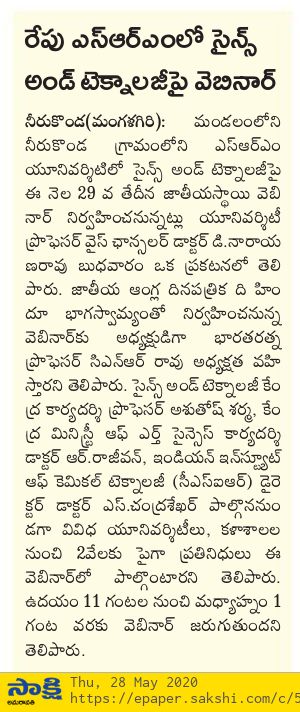
Nellore News – May 30
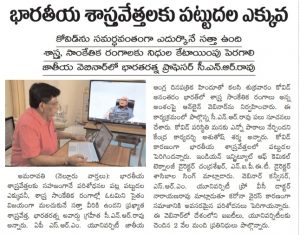
Vartha Prapancham – May 28
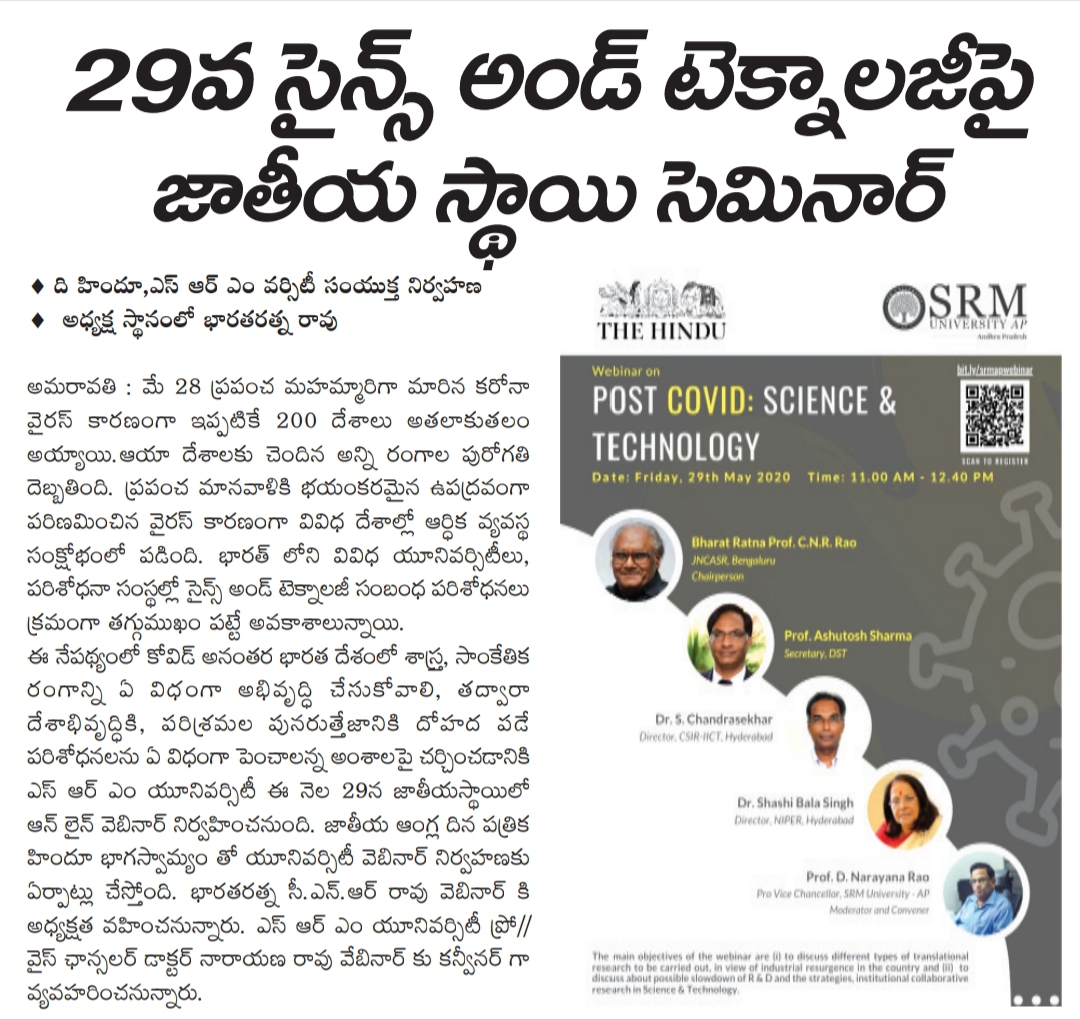
- PROVC Editorial in THE PIONEER May 28, 2020
The Pioneer – May 27 – Delhi
Continue reading →
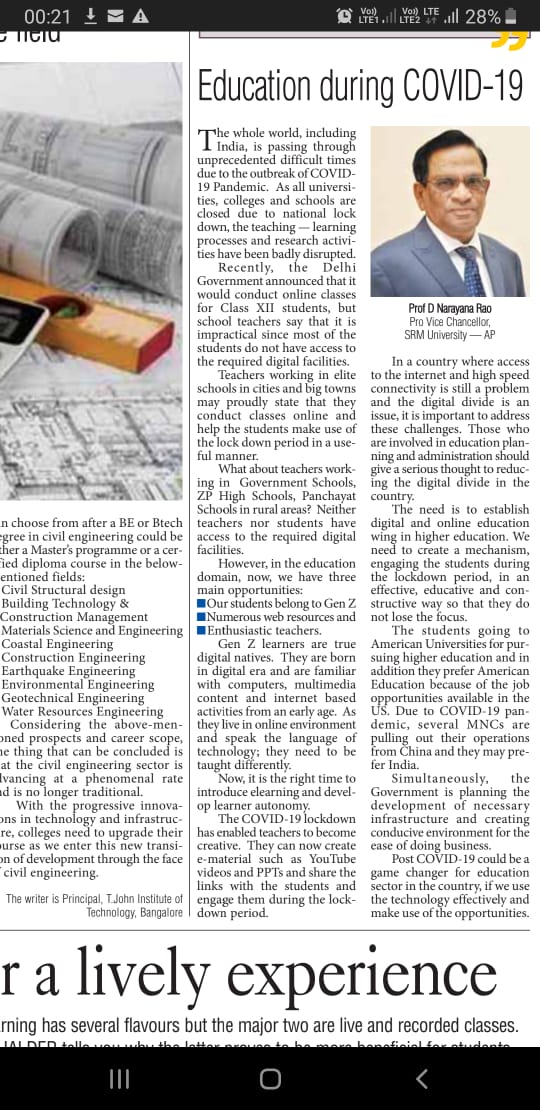
PROVC – The Hans – May 11
the-pioneer

- Vyshnavi Hackathon May 28, 2020
The Hindu
Continue reading →
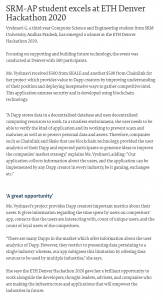
edex
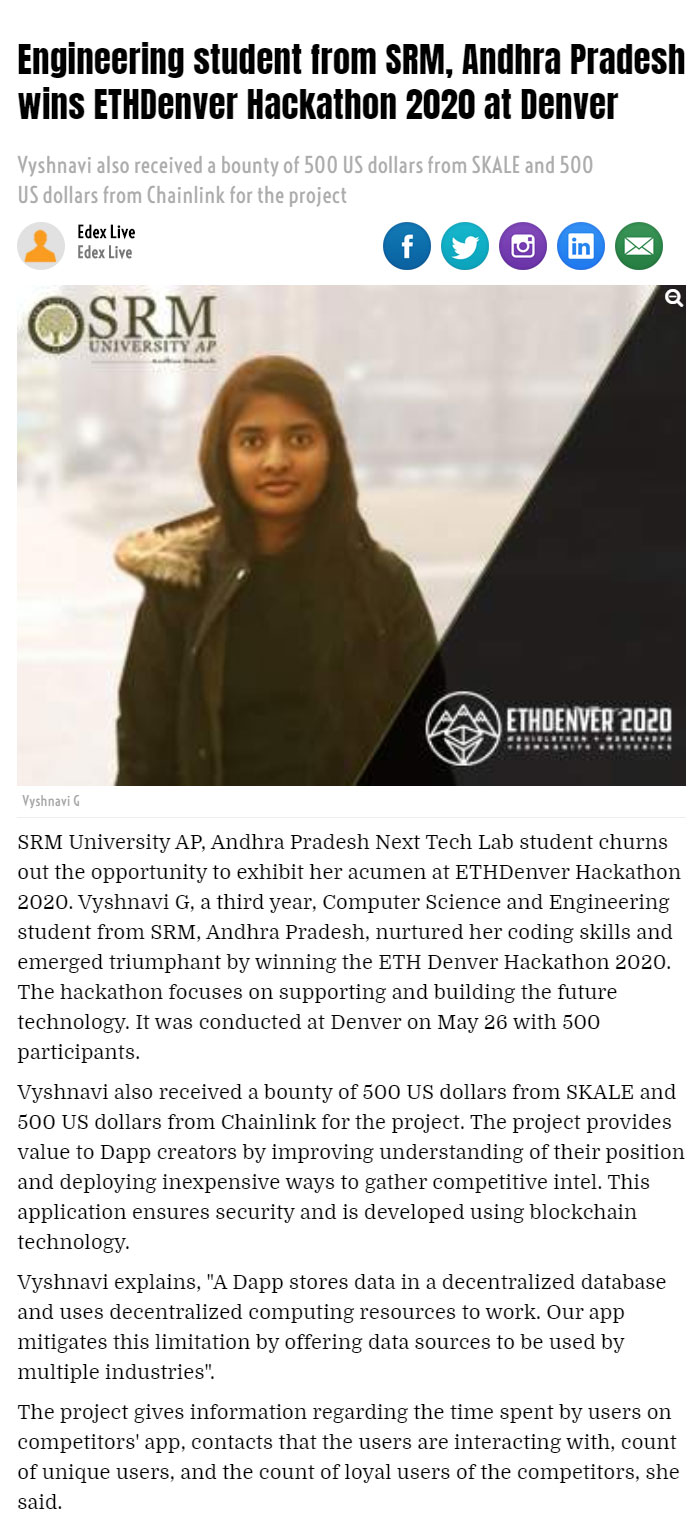
careers-360
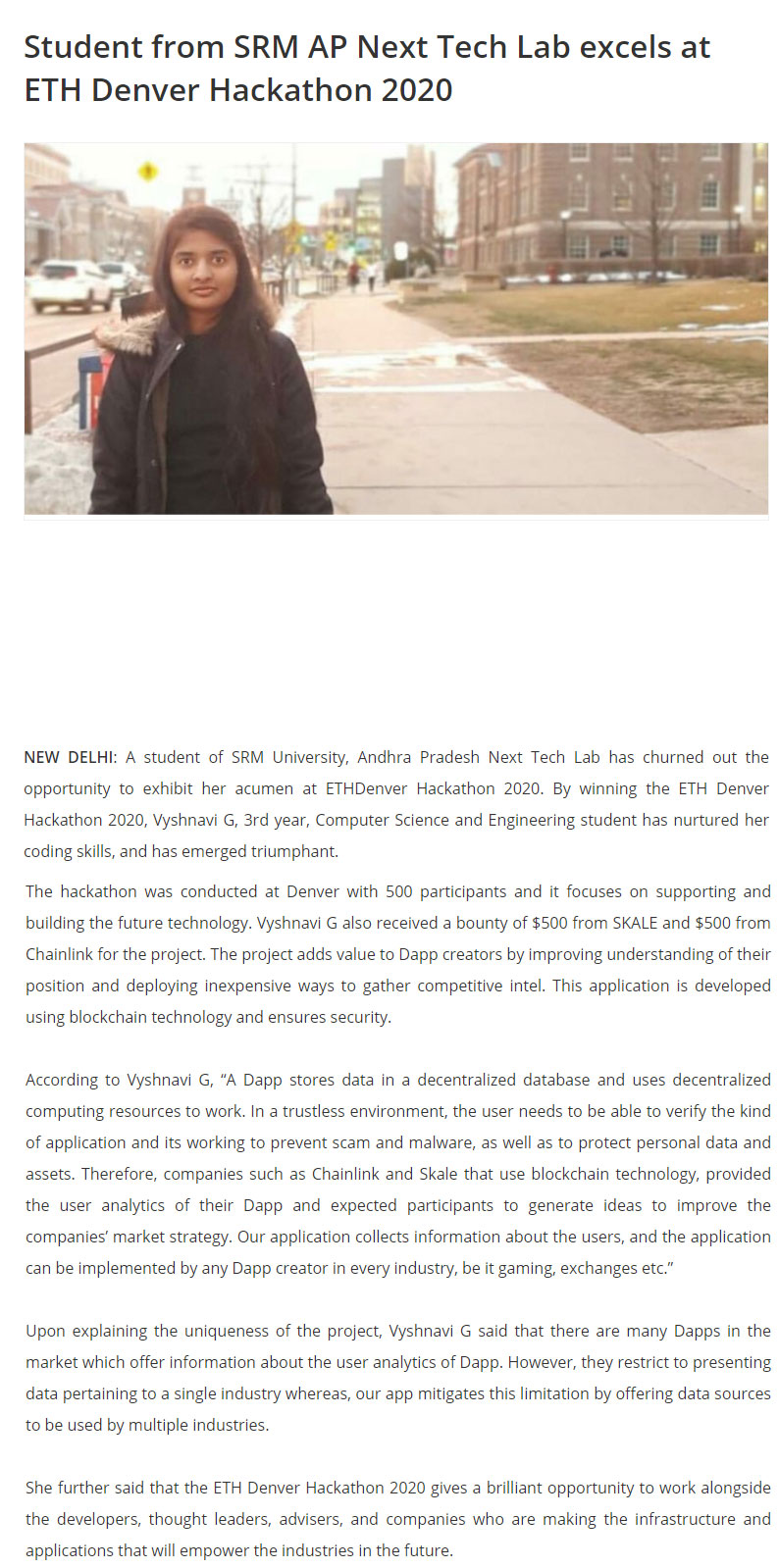
college-dunia
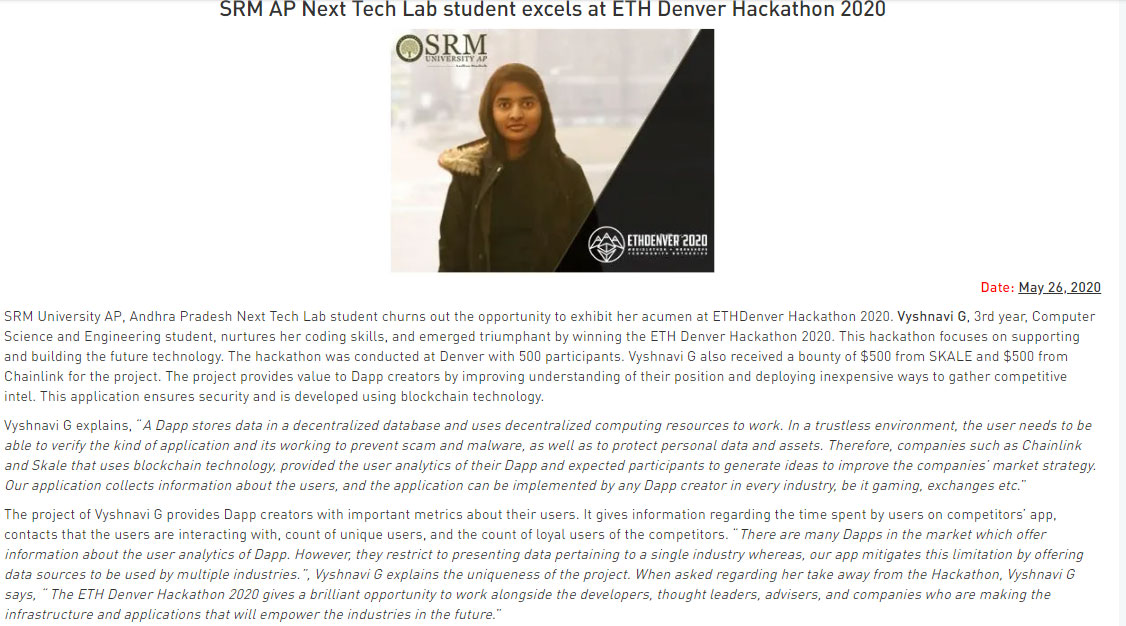
global-green-news
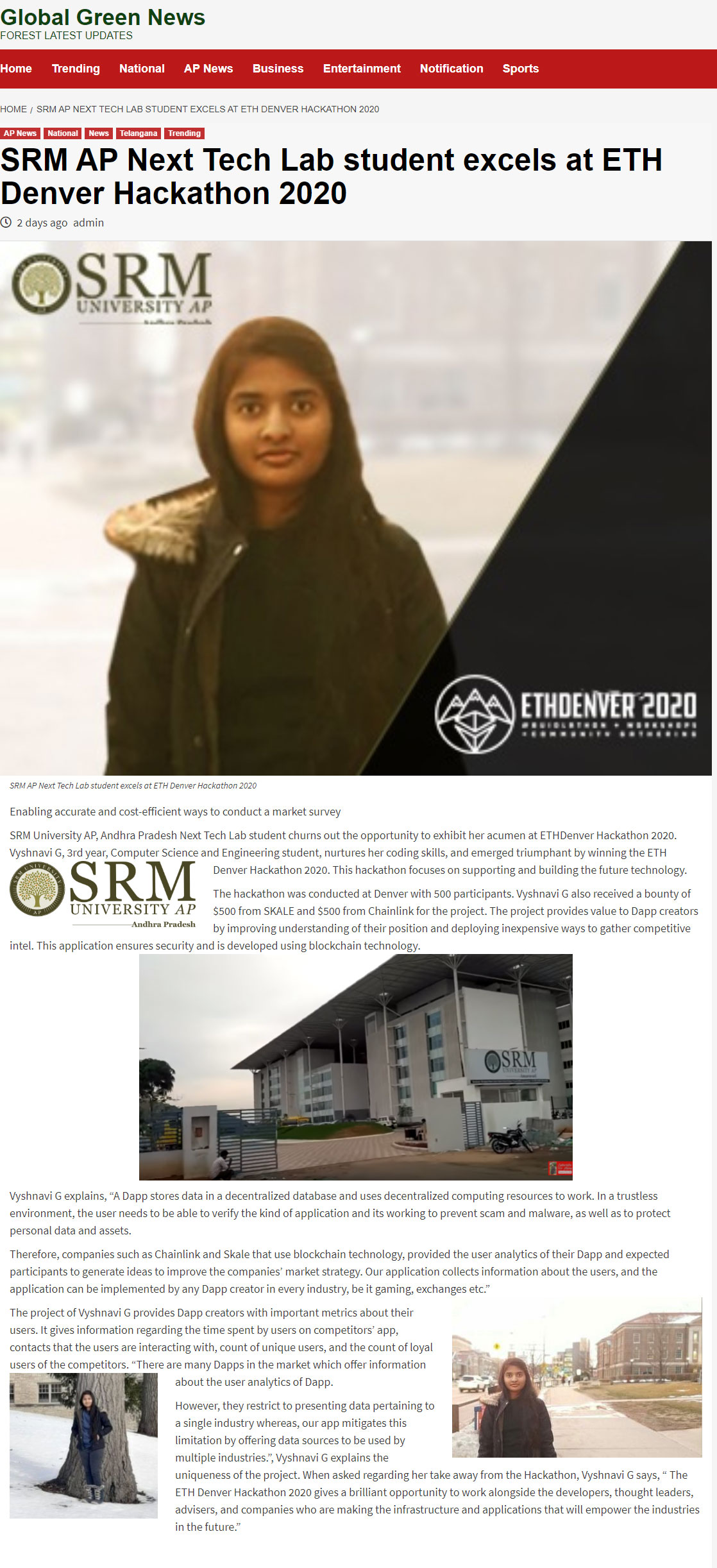
india-education-dairy
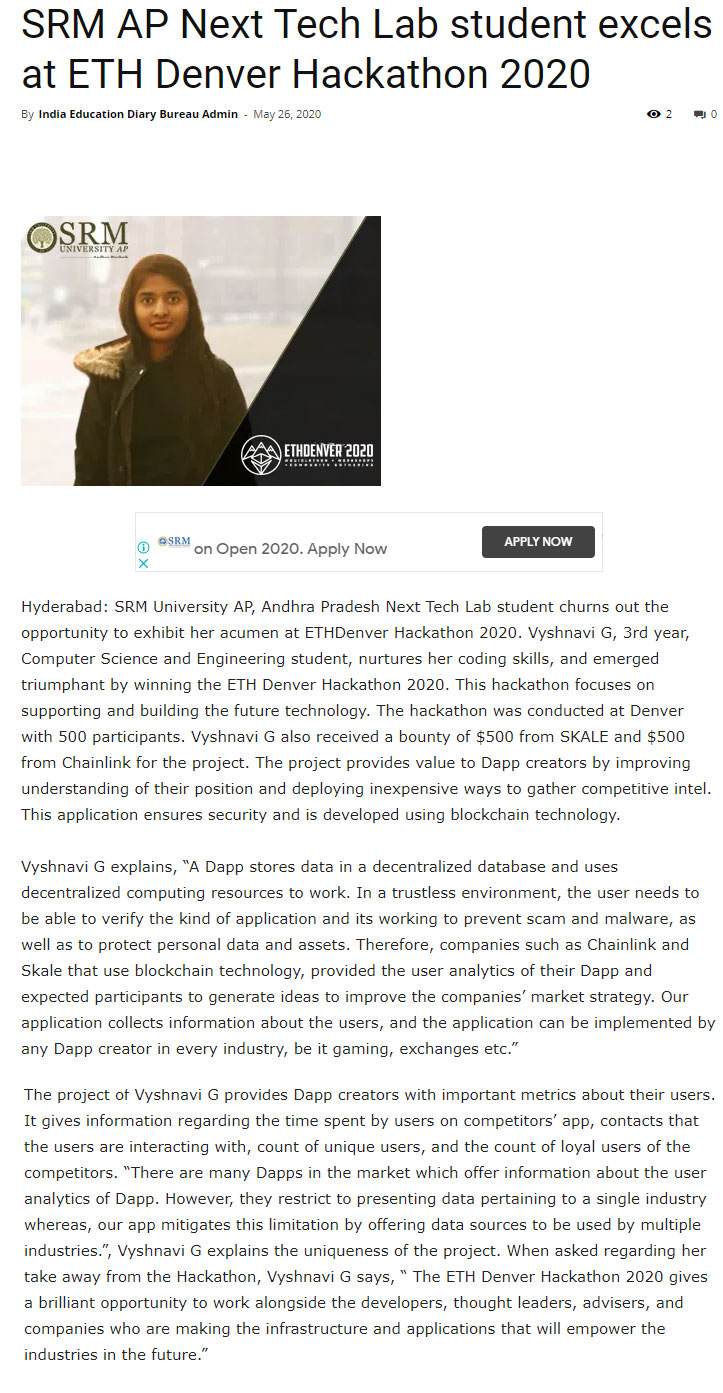
mangala-times
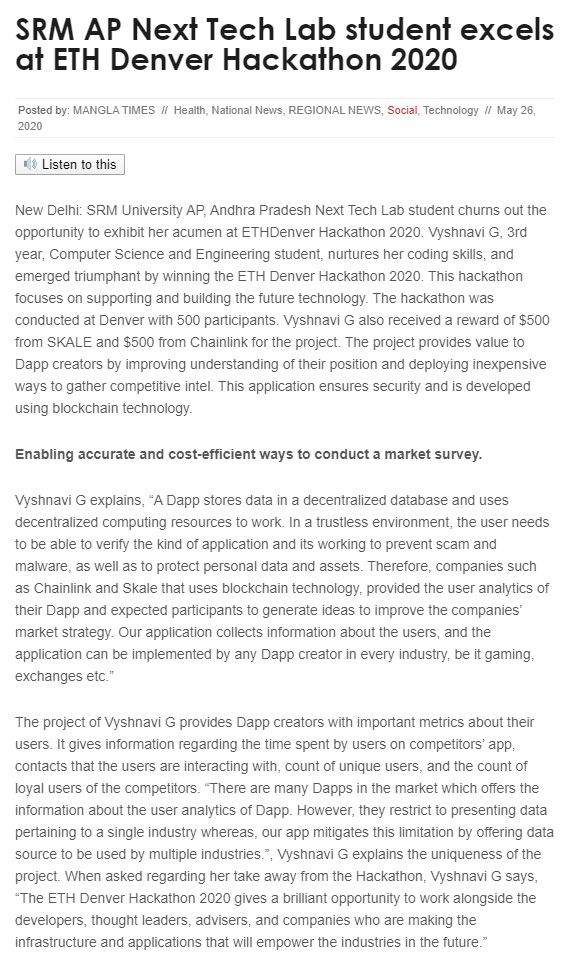
Photo Chronicle – May 27
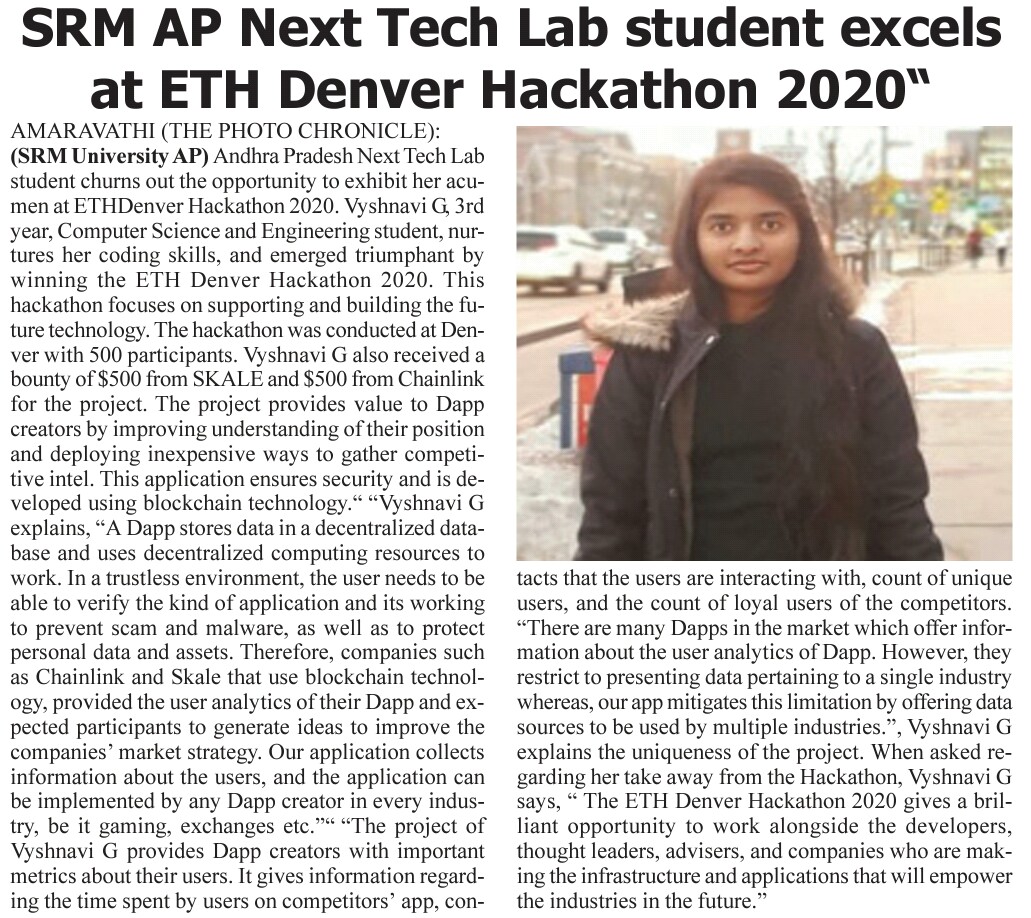
shiksha
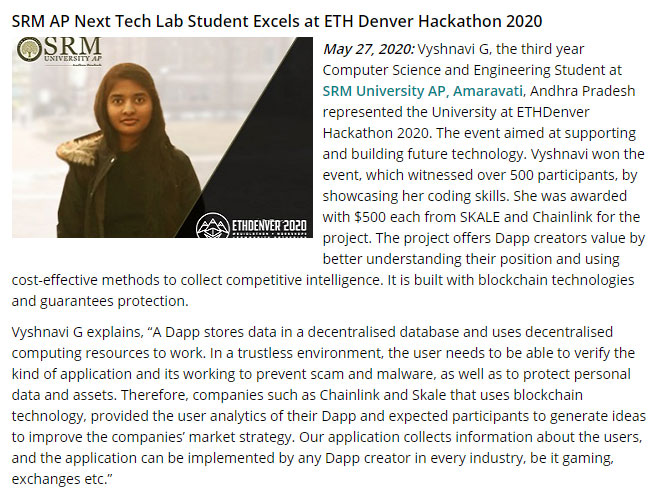
technology-for-you
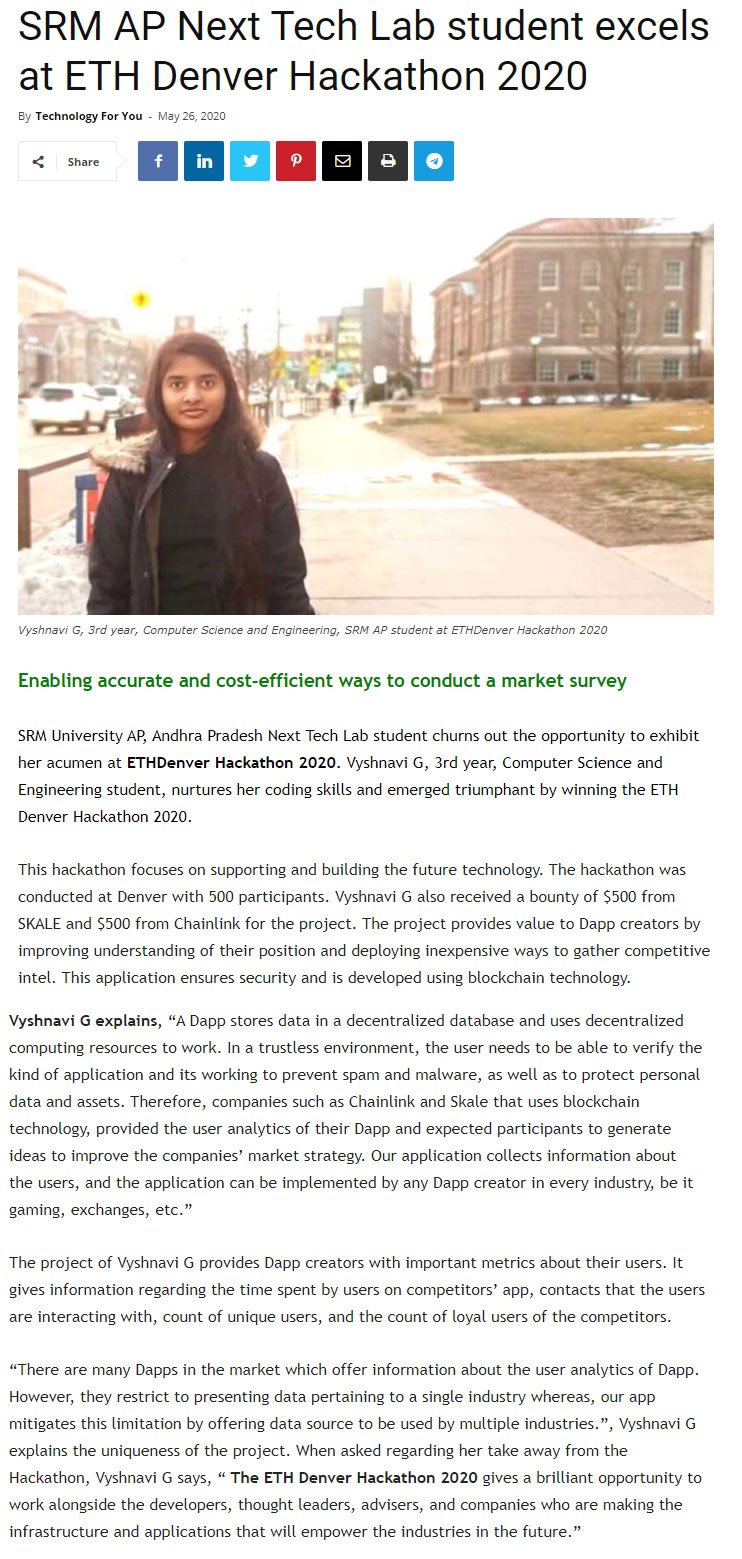
united-news-of-india
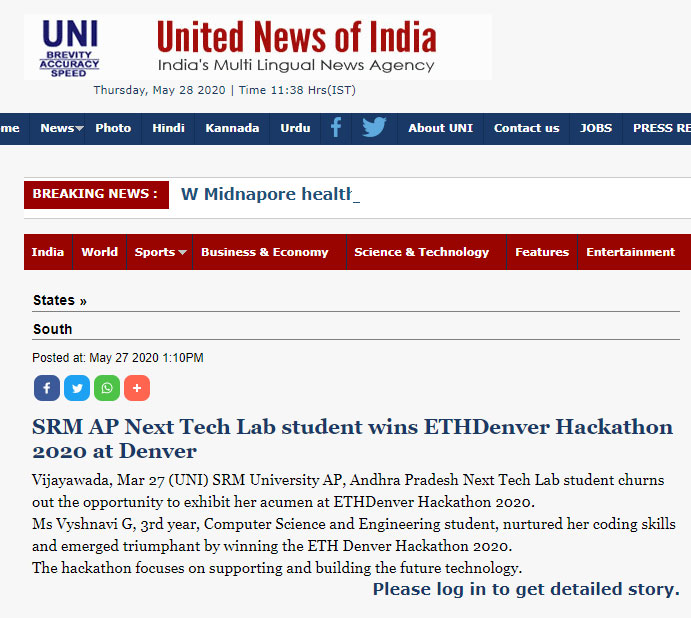
Andhra Naadu – May 27
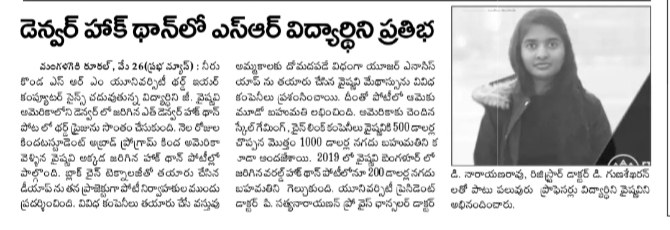
AndhraPrabha – May 27
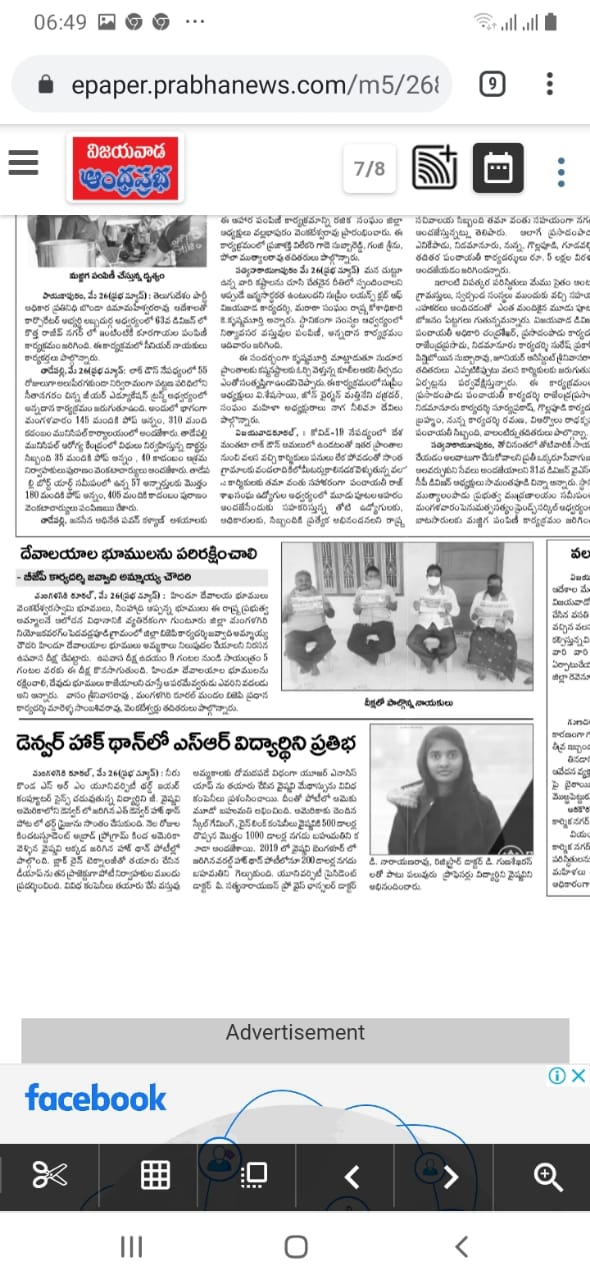
- Scaling up hydrogen production: an alternative energy source to conventional fuels May 27, 2020
Chemical Engineering Journal publishes paper of Dr. Lakhveer Singh with Impact Factor 8.34
Dr. Lakhveer Singh, Assistant Professor, Department of Environmental Science, SRM University AP, Andhra Pradesh published a paper in the Chemical Engineering Journal with an Impact Factor of 8.34. His paper titled, Breaking the Loop: Tackling Homoacetogenesis by Chloroform to Halt Hydrogen Production-Consumption Loop in Single Chamber Microbial Electrolysis Cells is published in collaboration with Oregon State University.
Single Chamber Microbial Electrochemical Cells reactor is used to produce hydrogen. Since wastewater is used in the process, hydrogen consumers are present inside the reactors. The presence of homo acetogenesis and hydrogen production-consumption loop significantly hinders the efficient hydrogen recovery from this reactor. Removal of homo acetogenins remained a challenge that is mitigated by the research work conducted in this paper. Dr. Lakhveer informs, “Prof. Hong Liu is the mother of the bioelectrochemical system. I used to work with her for 1.5 years during my Post Doctorate. We developed the method to inhibit homo acetogenins in bioelectrochemical fuel cells for the first time to exhibit homo acetogenins which enhance the hydrogen production in scaled-up microbial electrochemical (MEC).”
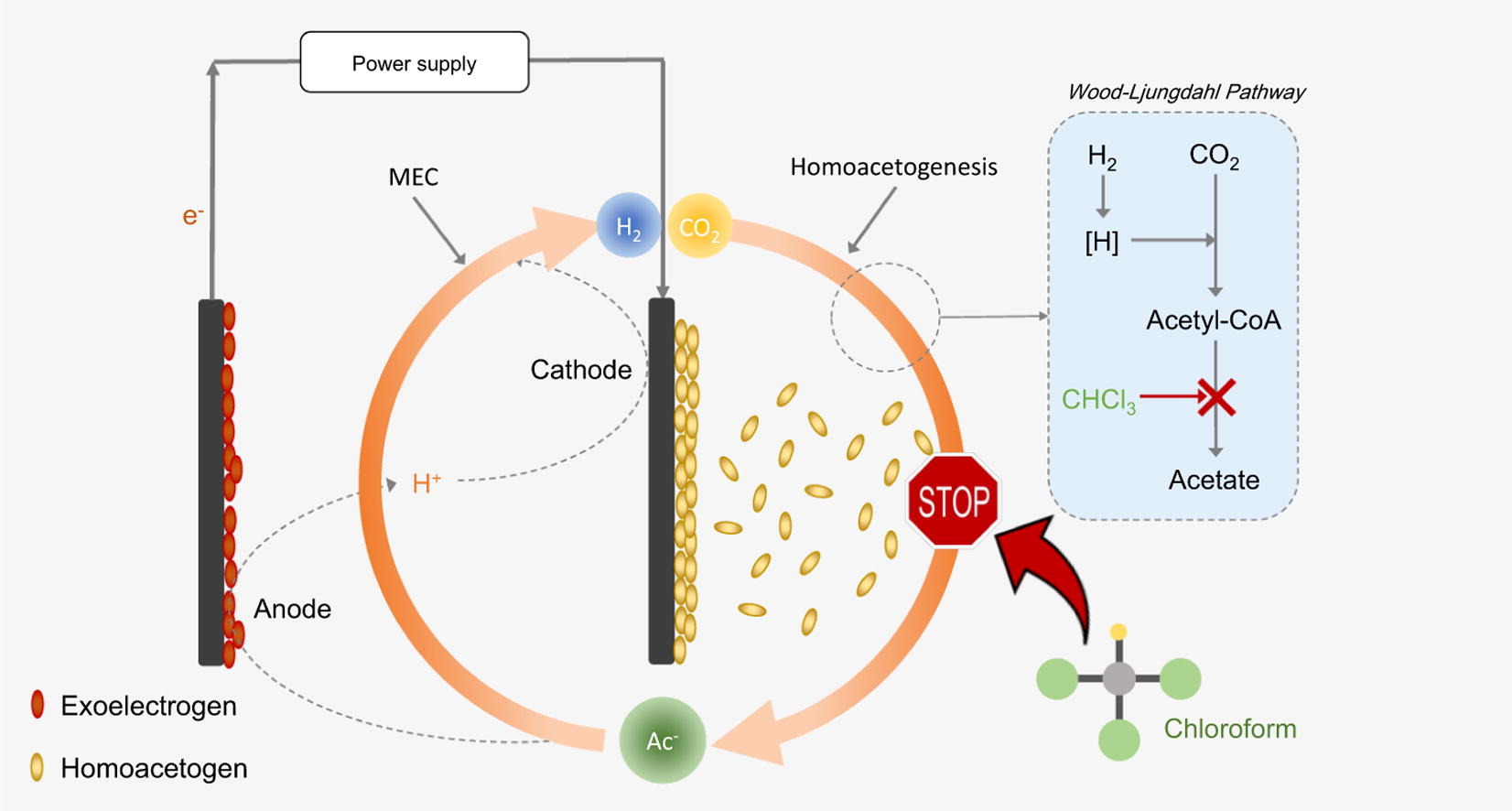 Method to inhibit homo acetogenins in bioelectrochemical fuel cells
Method to inhibit homo acetogenins in bioelectrochemical fuel cellsA small concentration of chloroform is used in the process, which after the experiment leaves traces of merely 0.001% which is negligible. Furthermore, 0.02 ml chloroform is used in ten litres of reactors, negating the chance of causing damage to the environment. “Microbial community analysis revealed that the amount ofhomoacetogenic Acetobacterium spp. was eliminated in the cathodic biofilms and planktonic cells by chloroform.”, enlightens Dr. Lakhveer. This method can also be applied in large scale reactors to enhance hydrogen production by inhibiting homo acetogenins. The hydrogen production rate is nearly 20 litres per hour from the reactor. The application of this reactor is the production of energy which can be used as an alternative to conventional fuel.
Advancing the work, Dr. Lakhveer aspires to improve this method in the future, through reducing the residual chloroform concentration and developing more environment-friendly inhibitor using similar mechanisms, that may lead to the practical application in MECs.
Continue reading → - SRM AP students’ illustrious achievements at LA Hacks 2020 May 26, 2020
 Amid the unparalleled catastrophe in the form of widespread COVID-19, SRM University AP, Andhra Pradesh, students at Semester Abroad Program develop projects to combat the crisis. Vyshnavi G and Padmateja, 3rd year, Computer Science and Engineering students went to University of Wisconsin, Madison, and University of California, Berkeley respectively for their Semester Abroad Program. During their stay, they presented two projects at LA Hacks 2020, Southern California, and won accolades galore. The hackathon is one of the largest in the world and was held on March 27-29. Many hackers and innovators participated to create and collaborate at UCLA’s virtual event. SRM AP students submitted two projects in this hackathon as a single team and emerged as a finalist in the “Best Overall Hack”. The students developed Safely, the project title sponsored by Facebook as “Best Collaboration Hack”, and also worked on Go Farm which was sponsored by Honey as “Best Consumer Hack”. The team coordinated through Slack as the hackathon was turned into a virtual competition with the unfortunate outbreak of COVID-19.
Amid the unparalleled catastrophe in the form of widespread COVID-19, SRM University AP, Andhra Pradesh, students at Semester Abroad Program develop projects to combat the crisis. Vyshnavi G and Padmateja, 3rd year, Computer Science and Engineering students went to University of Wisconsin, Madison, and University of California, Berkeley respectively for their Semester Abroad Program. During their stay, they presented two projects at LA Hacks 2020, Southern California, and won accolades galore. The hackathon is one of the largest in the world and was held on March 27-29. Many hackers and innovators participated to create and collaborate at UCLA’s virtual event. SRM AP students submitted two projects in this hackathon as a single team and emerged as a finalist in the “Best Overall Hack”. The students developed Safely, the project title sponsored by Facebook as “Best Collaboration Hack”, and also worked on Go Farm which was sponsored by Honey as “Best Consumer Hack”. The team coordinated through Slack as the hackathon was turned into a virtual competition with the unfortunate outbreak of COVID-19.Safely is a society-based pandemic monitoring application for reporting and tracking precise geolocations of COVID-19 cases. Safely allows users to report their own condition, be it healthy, symptomatic, diagnosed, or recovered along with their geolocation. The application enables users to identify areas around them on a map. Based on the shade of the regions displayed on the map, the user deciphers the risk of contagion. Areas with symptomatic users display lighter shades, whereas locations with diagnosed patients and regions with a high concentration of affected users, show up as darker shades on the map. “With COVID-19 spreading rapidly, there are not enough resources to find or report the exact geographical information of new cases. People would want to be cautious by avoiding specific locations that have a lot of reported cases. Also, it enables help agencies to recognize areas where resources are required to be sent. Tracking COVID-19 can be especially difficult in developing countries with weaker infrastructure. “, Vyshnavi G explains the issues that inspired her to build this project.
GoFarm primarily benefits the farmers and improves consumer satisfaction. It is an application where a farmer can post information regarding harvested crops including vegetables, pulses along with quoting the price of the products. The customer can search for nearby farms using google maps and purchase through this platform. Padmateja says, “In India where agriculture sector employs more than 50% of the total workforce, we have come across many incidents in which farmers are suffering because of high debt burdens, corruption in subsidies, and crop failure. We thought to use our skills to develop an application that gives them profit. Not getting enough money for their crop is the most serious problem that they are facing right now. At the same time, we decided to emphasize on the consumer satisfaction. Eliminating third parties and connecting farmers with customers would be helpful in upgrading the agricultural sector. Due to COVID-19 outbreak, it has become more crucial for the consumers to be informed regarding stores responsible for the delivery of the product.”
In the future, the team wants to add a crop recommendation system for the farmers in the platform based on weather conditions. The students also plan to expand the availability of the application to many farmers and consumers across the nation.
Continue reading → - Tousif Award May 25, 2020
Photo Chronicle – May 23
Continue reading →
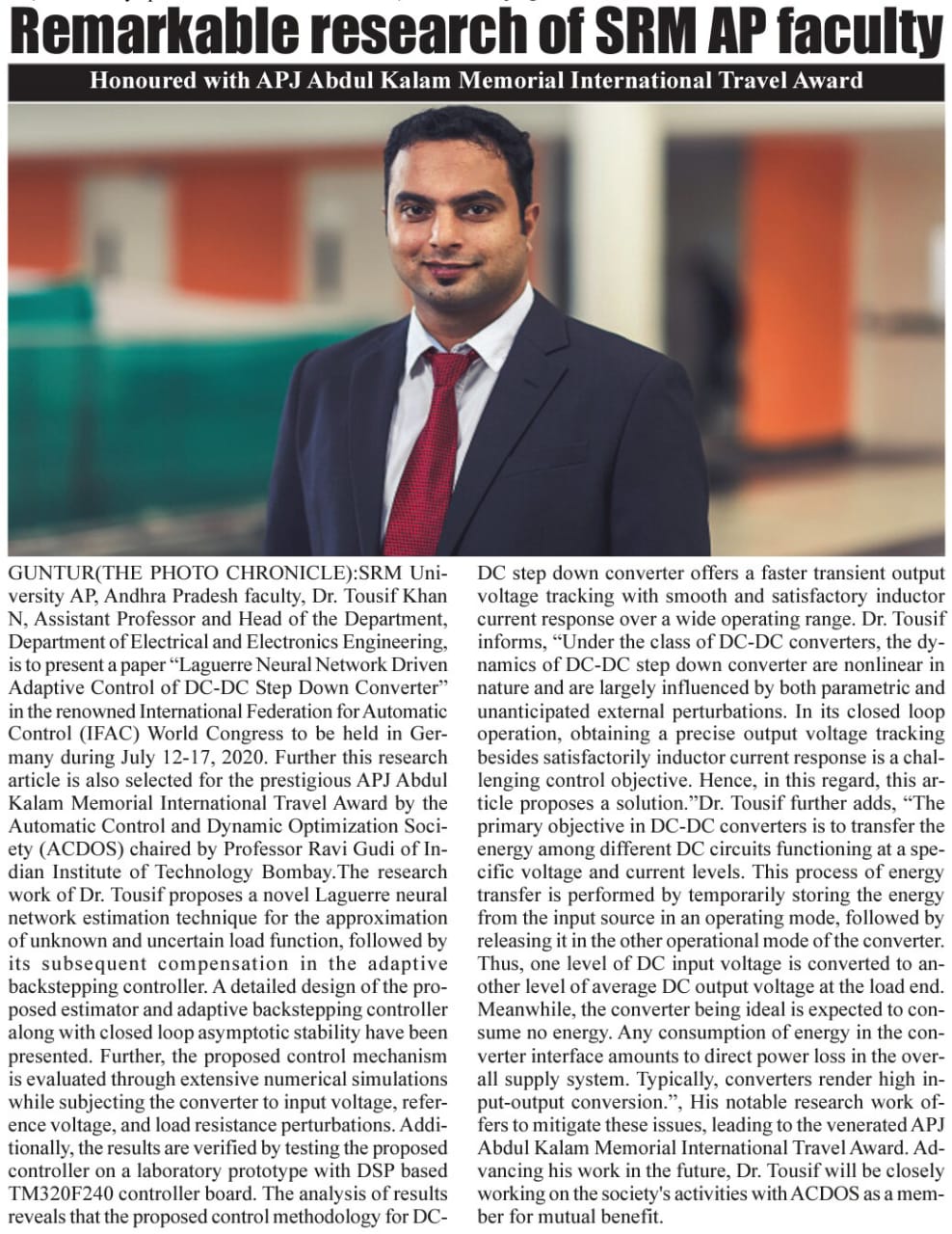
The Daily Pioneer – Pg 2 – May 23
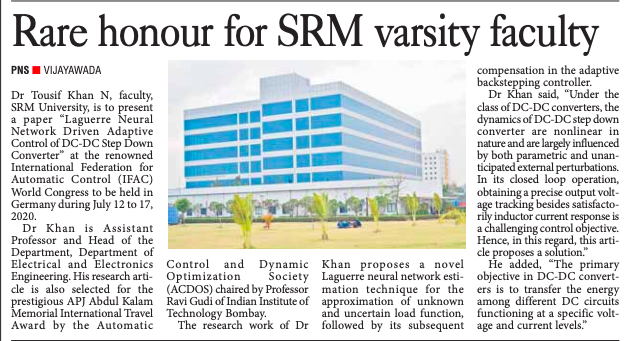
college Dunia
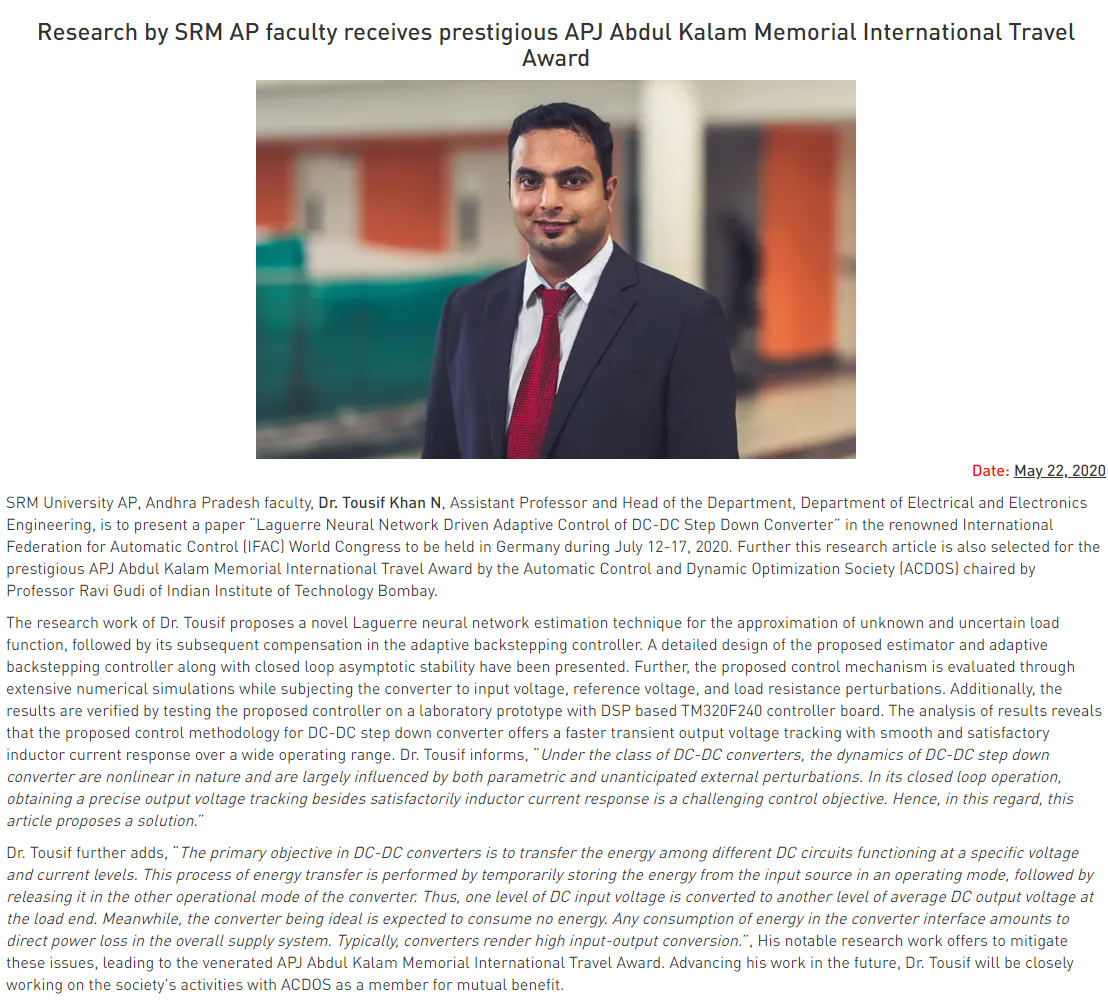
Andhara Prabha – May 23
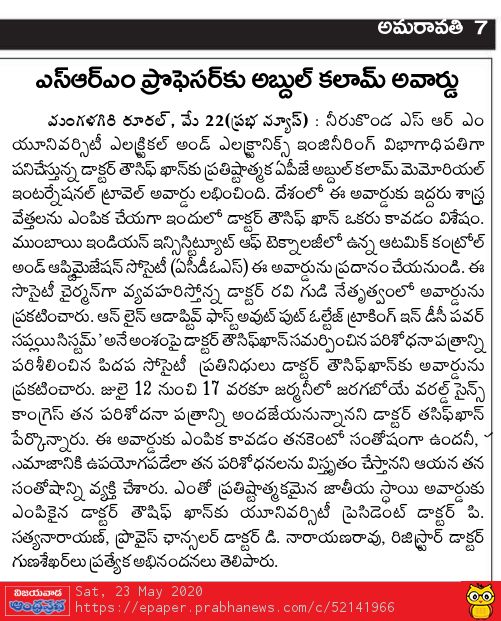
AndhraJyoti – May 23
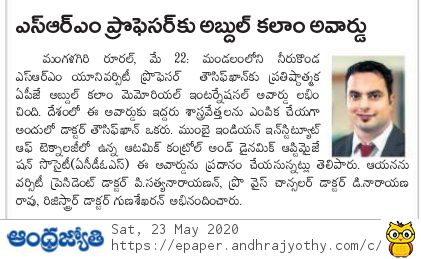
AP I News Daily – May 23
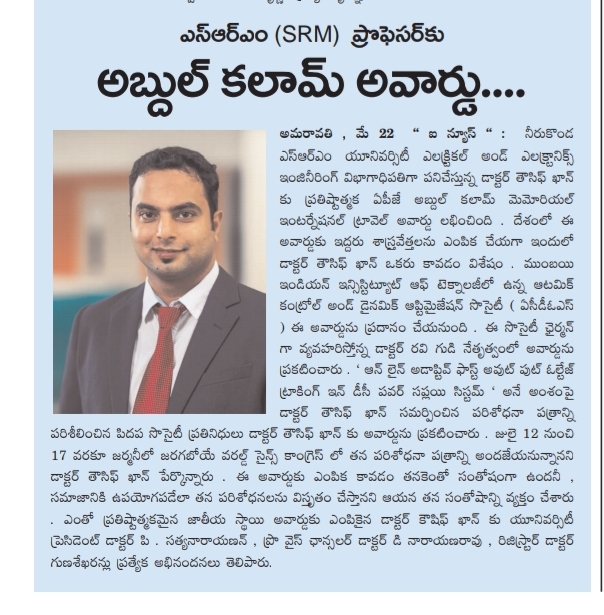
Eenadu – May 23
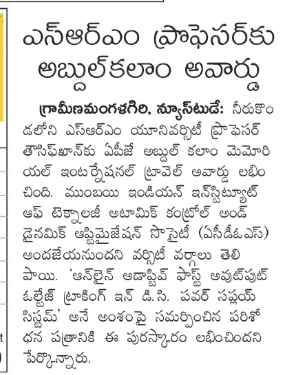
Sakshi – May 23
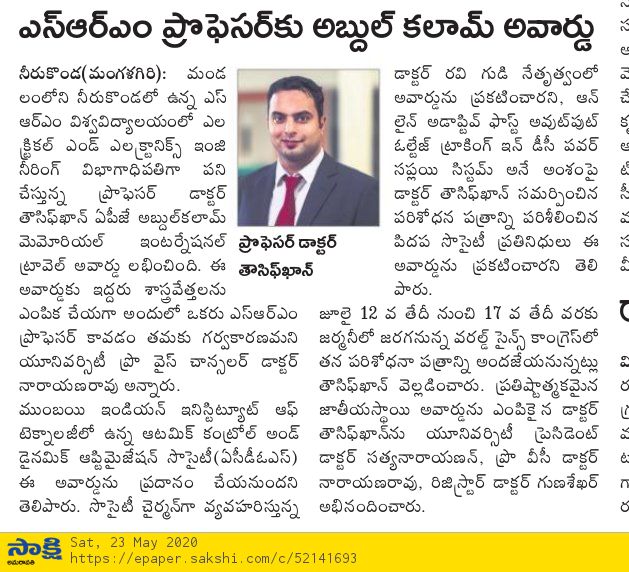
Financal Express – May 24
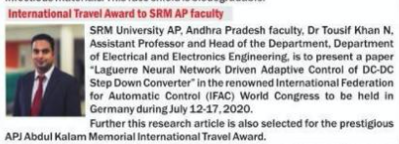
- Faceshield 2.0 Aditya May 25, 2020
The Hans – Pg 7 – May 22 – Faceshield 2.0
Continue reading →
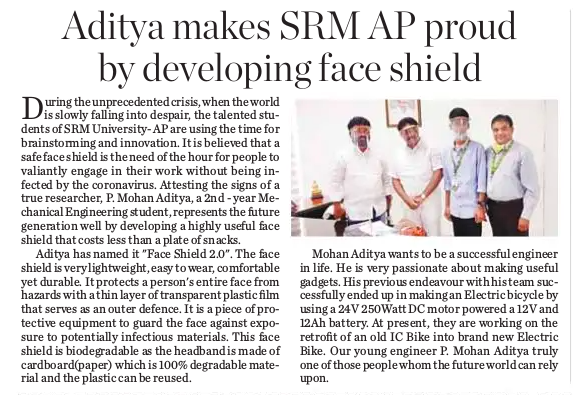
yourstory
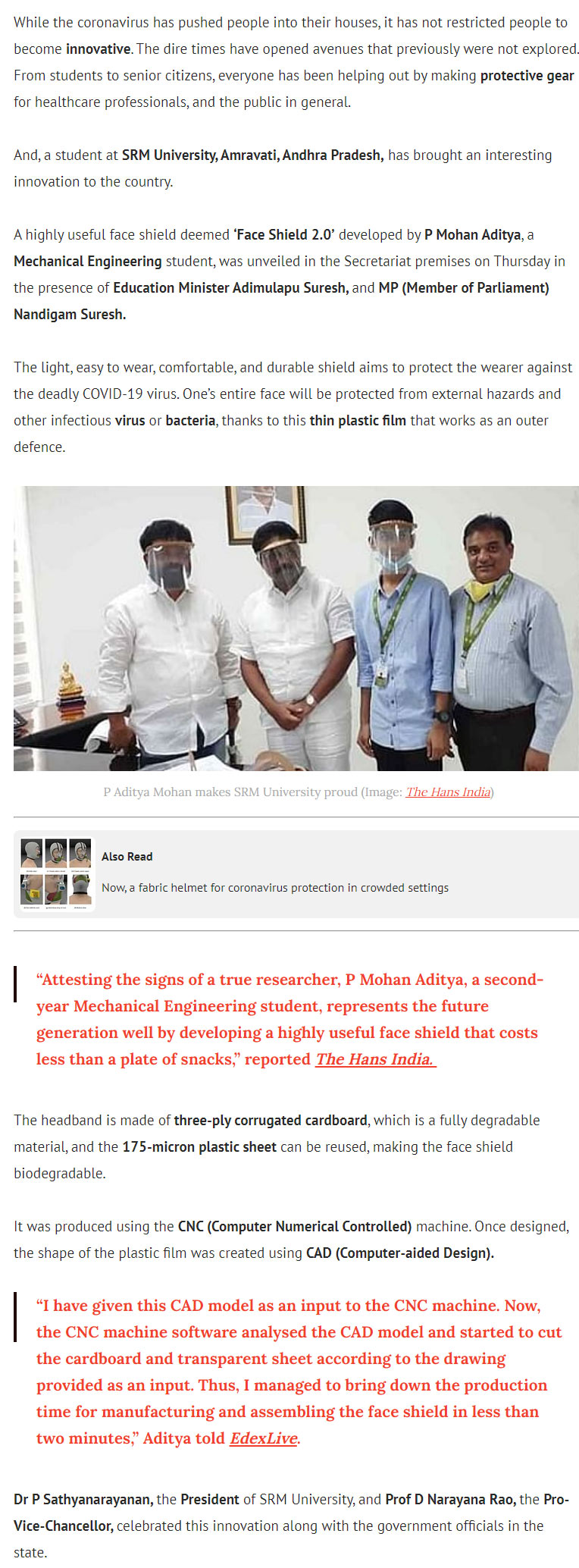
ap7am

edex
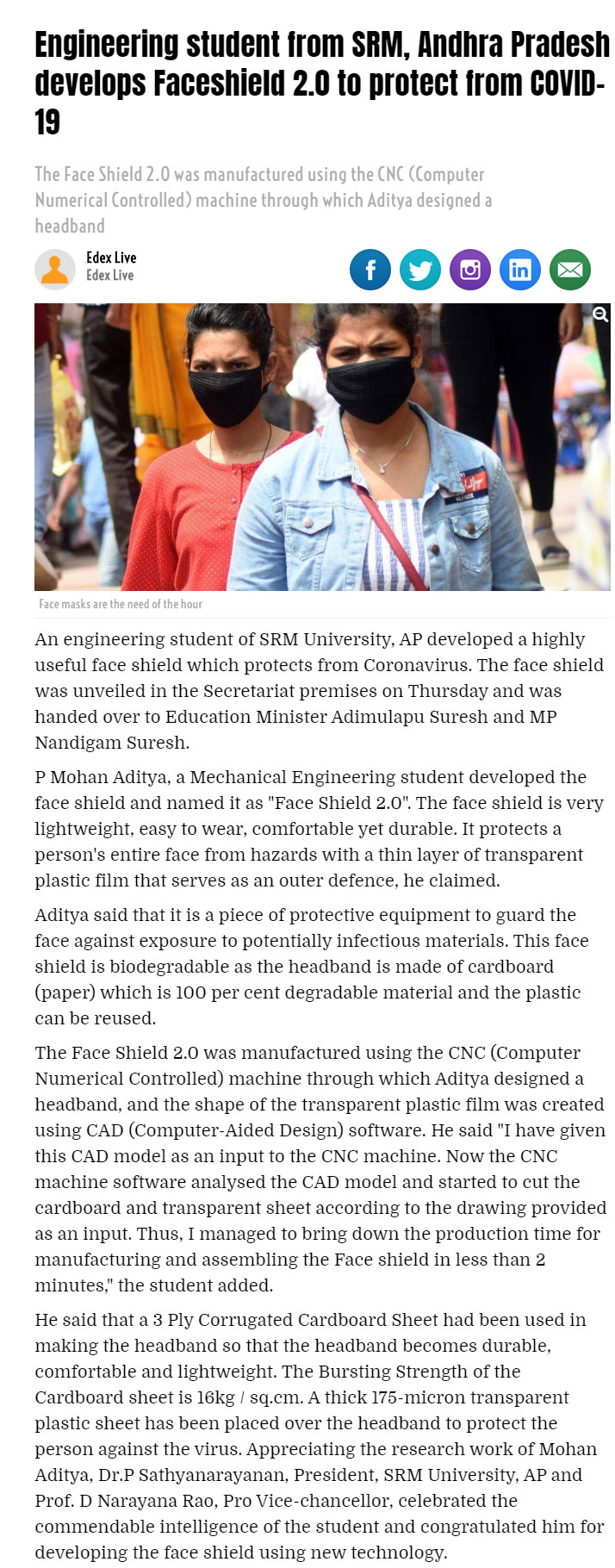
united-news-of-india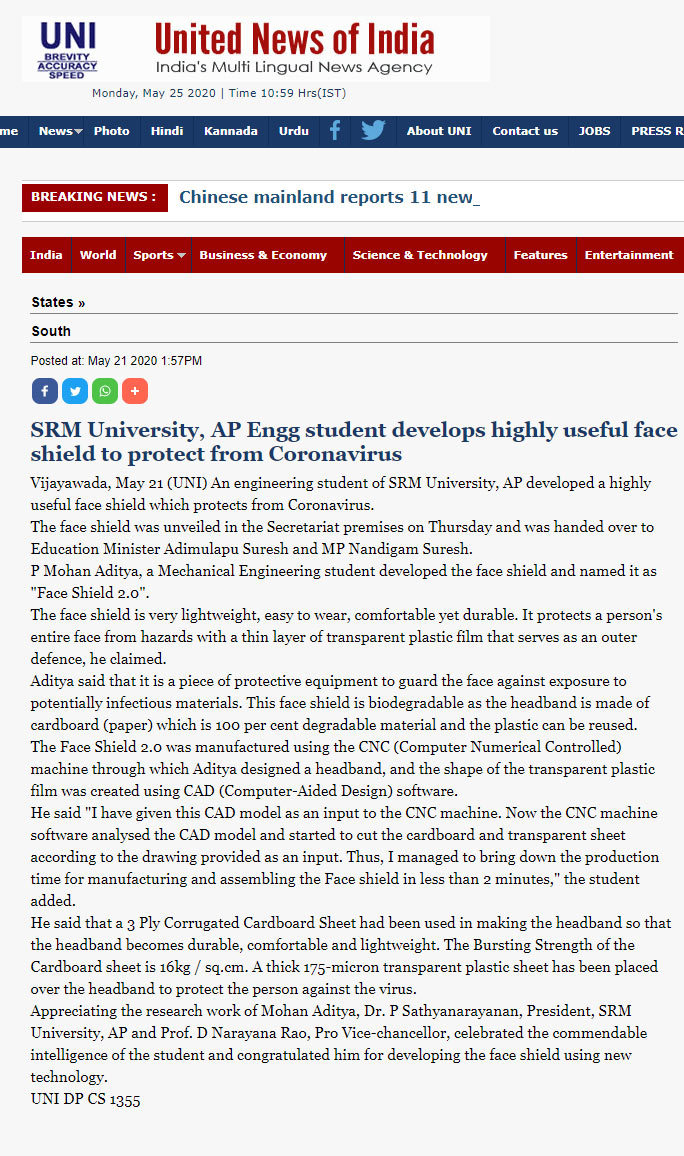
Andhra Naadu – May 22 – Faceshield 2.0
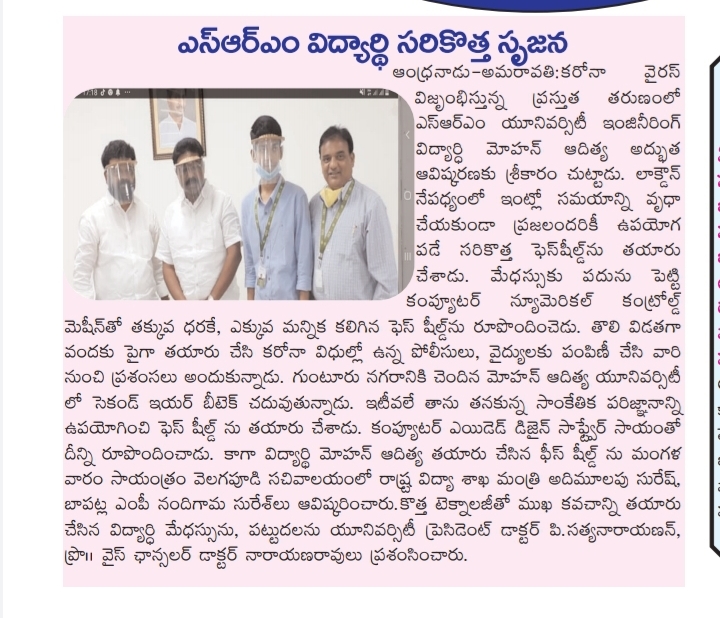
Andhra Prabha _ May 21 – Faceshield 2.0
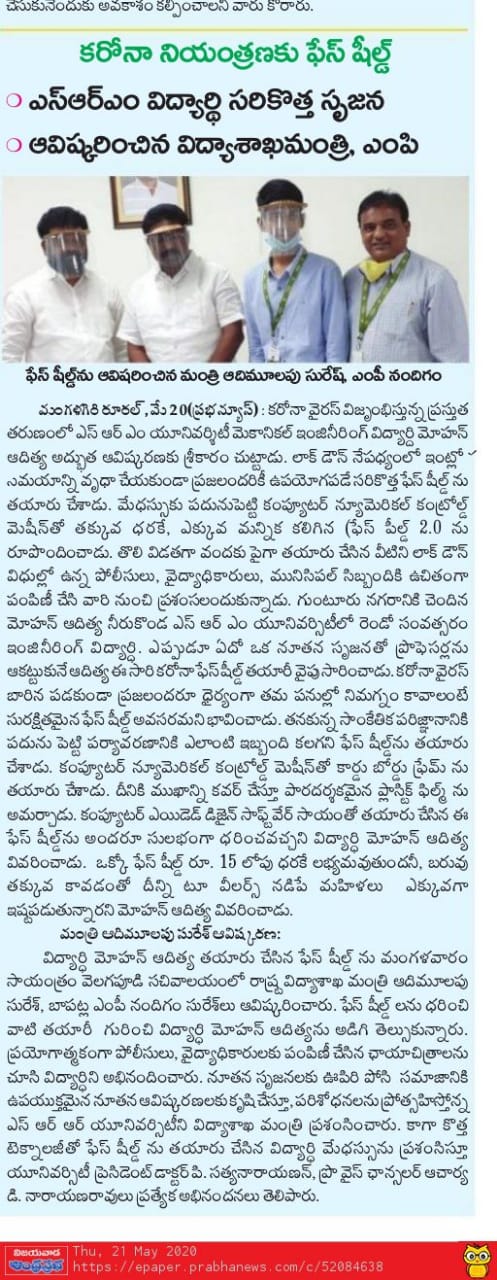
AP iNEWS – May 21 – Faceshield 2.0
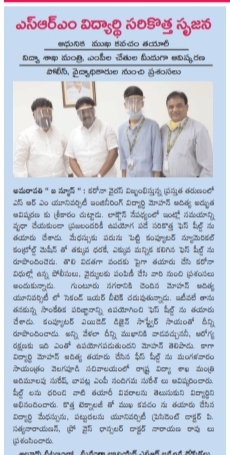
Nellore News – May 21 – Faceshield
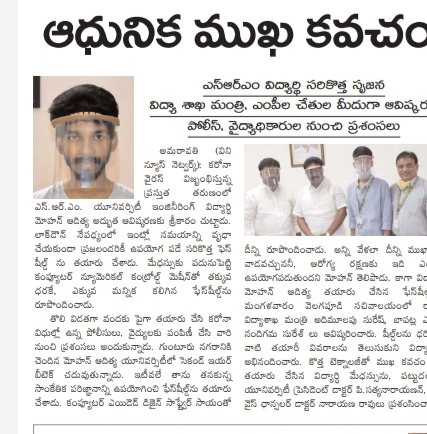
Palanadu Vaartha – May 21 – FaceShield 2.0
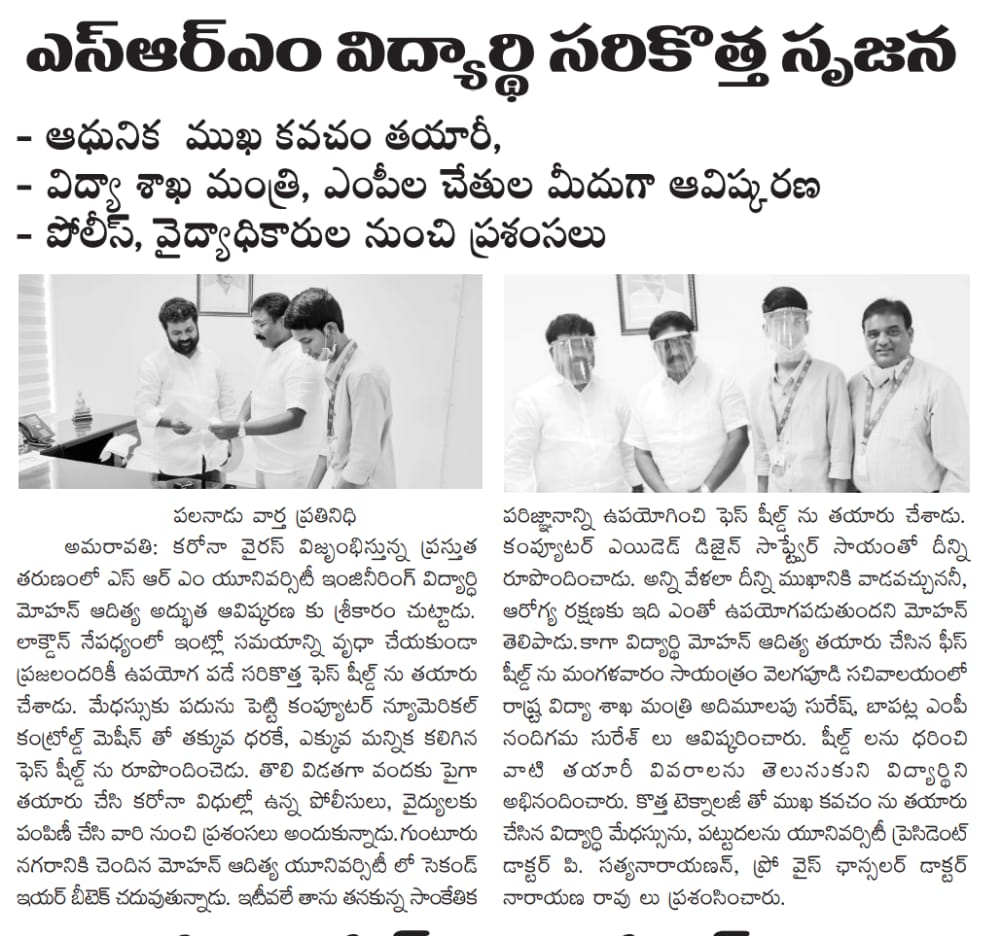
Rajadhani Varthalu – May 21 – Faceshield 2.0
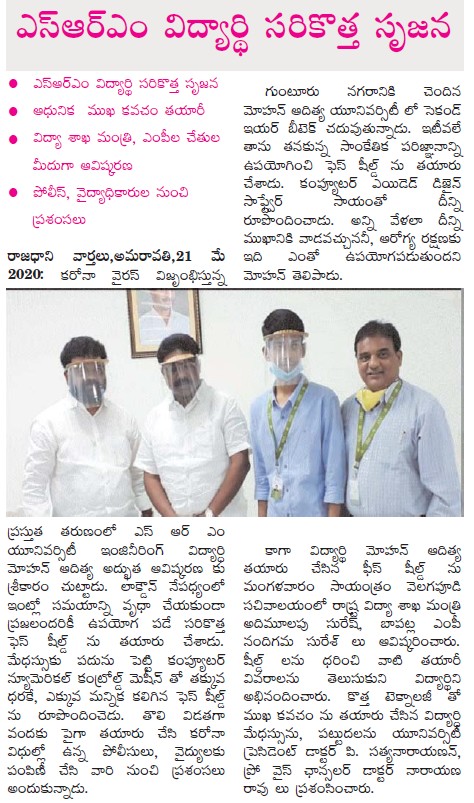
Sakshi – May 21 – Faceshield 2.0
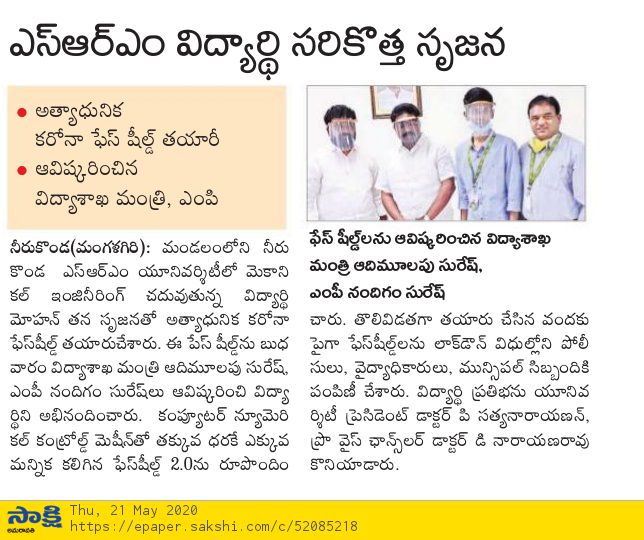
Vartha Prapancham – May 21 – Faceshield 2.0
